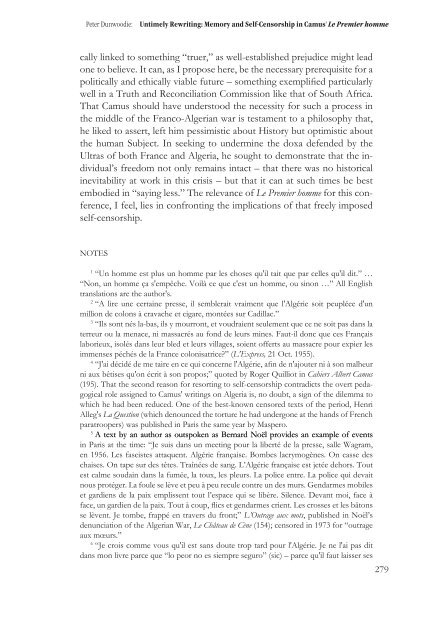Literatura in cenzura - Društvo za primerjalno književnost - ZRC SAZU
Literatura in cenzura - Društvo za primerjalno književnost - ZRC SAZU
Literatura in cenzura - Društvo za primerjalno književnost - ZRC SAZU
- No tags were found...
Create successful ePaper yourself
Turn your PDF publications into a flip-book with our unique Google optimized e-Paper software.
Peter Dunwoodie:Untimely Rewrit<strong>in</strong>g: Memory and Self-Censorship <strong>in</strong> Camus' Le Premier hommecally l<strong>in</strong>ked to someth<strong>in</strong>g “truer,” as well-established prejudice might leadone to believe. It can, as I propose here, be the necessary prerequisite for apolitically and ethically viable future – someth<strong>in</strong>g exemplified particularlywell <strong>in</strong> a Truth and Reconciliation Commission like that of South Africa.That Camus should have understood the necessity for such a process <strong>in</strong>the middle of the Franco-Algerian war is testament to a philosophy that,he liked to assert, left him pessimistic about History but optimistic aboutthe human Subject. In seek<strong>in</strong>g to underm<strong>in</strong>e the doxa defended by theUltras of both France and Algeria, he sought to demonstrate that the <strong>in</strong>dividual’sfreedom not only rema<strong>in</strong>s <strong>in</strong>tact – that there was no historical<strong>in</strong>evitability at work <strong>in</strong> this crisis – but that it can at such times be bestembodied <strong>in</strong> “say<strong>in</strong>g less.” The relevance of Le Premier homme for this conference,I feel, lies <strong>in</strong> confront<strong>in</strong>g the implications of that freely imposedself-censorship.NOTES1“Un homme est plus un homme par les choses qu'il tait que par celles qu'il dit.” …“Non, un homme ça s'empêche. Voilà ce que c'est un homme, ou s<strong>in</strong>on …” All Englishtranslations are the author's.2“A lire une certa<strong>in</strong>e presse, il semblerait vraiment que l'Algérie soit peupléee d'unmillion de colons à cravache et cigare, montées sur Cadillac.”3“Ils sont nés la-bas, ils y mourront, et voudraient seulement que ce ne soit pas dans laterreur ou la menace, ni massacrés au fond de leurs m<strong>in</strong>es. Faut-il donc que ces Françaislaborieux, isolés dans leur bled et leurs villages, soient offerts au massacre pour expier lesimmenses péchés de la France colonisatrice?” (L'Express, 21 Oct. 1955).4“J'ai décidé de me taire en ce qui concerne l'Algérie, af<strong>in</strong> de n'ajouter ni à son malheurni aux bêtises qu'on écrit à son propos;” quoted by Roger Quilliot <strong>in</strong> Cahiers Albert Camus(195). That the second reason for resort<strong>in</strong>g to self-censorship contradicts the overt pedagogicalrole assigned to Camus' writ<strong>in</strong>gs on Algeria is, no doubt, a sign of the dilemma towhich he had been reduced. One of the best-known censored texts of the period, HenriAlleg's La Question (which denounced the torture he had undergone at the hands of Frenchparatroopers) was published <strong>in</strong> Paris the same year by Maspero.5 A text by an author as outspoken as Bernard Noël provides an example of events<strong>in</strong> Paris at the time: “Je suis dans un meet<strong>in</strong>g pour la liberté de la presse, salle Wagram,en 1956. Les fascistes attaquent. Algérie française. Bombes lacrymogènes. On casse deschaises. On tape sur des têtes. Traînées de sang. L’Algérie française est jetée dehors. Toutest calme souda<strong>in</strong> dans la fumée, la toux, les pleurs. La police entre. La police qui devaitnous protéger. La foule se lève et peu à peu recule contre un des murs. Gendarmes mobileset gardiens de la paix emplissent tout l’espace qui se libère. Silence. Devant moi, face àface, un gardien de la paix. Tout à coup, flics et gendarmes crient. Les crosses et les bâtonsse lèvent. Je tombe, frappé en travers du front;” L’Outrage aux mots, published <strong>in</strong> Noël’sdenunciation of the Algerian War, Le Château de Cène (154); censored <strong>in</strong> 1973 for “outrageaux mœurs.”6“Je crois comme vous qu'il est sans doute trop tard pour l'Algérie. Je ne l'ai pas ditdans mon livre parce que “lo peor no es siempre seguro” (sic) – parce qu'il faut laisser ses279
















